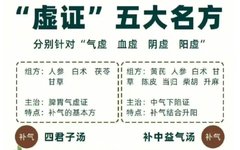Five Major Deficiency Syndromes:
1. The body deficiency is divided into four types: Qi deficiency, Blood deficiency, Yin deficiency, and Yang deficiency.
1. Qi Deficiency: The main manifestations of Qi deficiency include: shortness of breath, fatigue, low voice, shortness of breath upon exertion, easy sweating, dizziness, palpitations, pale yellow complexion, poor appetite, heat sensation, spontaneous sweating, prolapse of the rectum, uterine prolapse, pale and swollen tongue with tooth marks on the sides, weak pulse, etc. This indicates a decline in function, which may not necessarily indicate disease. Those with Qi deficiency need to tonify Qi, and suitable herbs for Qi tonification include Ren Shen (Ginseng), Huang Qi (Astragalus), and Dang Shen (Codonopsis).
Foods that tonify Qi include: beef, chicken, pork, glutinous rice, soybeans, white lentils, jujubes, crucian carp, carp, quail, yellow eel, shrimp, mushrooms, etc. These can be alternated regularly.
Foods to avoid for Qi deficiency include: hawthorn, bergamot, betel nut, garlic, turnip greens, coriander (cilantro), rutabaga, pepper, cardamom, middle finger, perilla leaves, mint, lotus leaves;
Foods to avoid or limit: buckwheat, pomelo, mandarin, kumquat, kumquat cake, orange, water chestnut, raw radish, earthworm, mustard greens, garlic chives, jujube, chrysanthemum, tea, and tobacco.
Corresponding dietary recommendations: Huai Shan Bai He Lian Zi Soup; Ren Yao Stewed Pigeon; Five-Spice Beef; Peanut and Jujube Braised Pig Trotters;
2. Blood Deficiency: The main manifestations of Blood deficiency include: pale yellow complexion, pale lips and nails, dizziness, fatigue, blurred vision, palpitations, insomnia with vivid dreams, dry stools, women experiencing irregular menstruation with light flow and pale color, pale tongue, slippery and dry coating, weak pulse, etc. For supplementation, it is advisable to use methods that tonify blood, nourish blood, and generate blood. Suitable herbs for blood tonification include Dang Gui (Angelica Sinensis), E Jiao (Donkey-hide Gelatin), Shu Di Huang (Rehmannia), and Sang Shen Zi (Mulberry Fruit).
Foods that tonify Blood include: black-boned chicken, black sesame, walnut meat, longan meat, chicken, pig’s blood, pig liver, brown sugar, red beans, etc. These can be alternated regularly.
Foods to avoid for Blood deficiency include: water chestnut, garlic;
Corresponding dietary recommendations: Dang Gui Shu Di Black-boned Chicken; Huai Shan Beef Brisket Stew; Huai Ju Fish; Rose Huai Ju Drink.
Foods to avoid or limit: seaweed, grass cardamom, lotus leaves, white liquor, mint, chrysanthemum, betel nut, raw radish, etc.
3. Yin Deficiency: Also known as Yin deficiency with excessive heat, commonly referred to as empty heat. The main manifestations of Yin deficiency include: fear of heat, irritability, flushed cheeks, dry mouth and throat, dry stools, short and red urine, pale tongue with little moisture, five palms (the palms of both hands, soles of both feet, and the top of the head) feeling hot, night sweats, lower back pain, nocturnal emissions, red tongue, thin or peeled coating, thin and rapid pulse, etc. For supplementation, it is advisable to use methods that nourish Yin, tonify Yin, and support Yin. Suitable herbs for Yin deficiency include Sheng Di (Rehmannia), Mai Dong (Ophiopogon), Yu Zhu (Polygonatum), pearl powder, tremella, Cordyceps, Shi Hu (Dendrobium), and Gui Ban (Tortoise Shell).
Foods that tonify Yin include: soft-shelled turtle, bird’s nest, lily, duck meat, black fish, jellyfish, lotus root, enoki mushrooms, goji leaves, water chestnut, raw pears, etc. These can be alternated regularly.
Foods to avoid for Yin deficiency include: pepper, cinnamon;
Foods to avoid or limit: dog meat (for patients with cerebrovascular issues), lamb (for hepatitis patients), sparrow meat, seahorse, sea dragon, deer meat, crispy rice, fried peanuts, fried soybeans, fried melon seeds, popcorn, lychee, longan meat, bergamot, bayberry, garlic, chives, mustard greens, chili, garlic chives, ginger, cardamom, pepper, white cardamom, star anise, fennel, clove, mint, white liquor, cigarettes, red ginseng, Cistanche, and Epimedium.
Corresponding dietary recommendations: Golden Pot Rich Tofu; Huai Shan Small Bundle Meat; Huai Ju Jujube and Tremella Soup; Soft-shelled Turtle and Huai Niu Xi Soup; Farmer’s Grilled Fish; Huai Shan One Dish Elbow; Golden Pot Rich Tofu; Huai Shan Stewed Native Chicken; Ren Yao Stewed Pigeon; He Shou Wu Stewed Pig Liver;
4. Yang Deficiency: Also known as Yang deficiency with declining fire, which is a further development of Qi deficiency. The main manifestations of Yang deficiency include: in addition to the symptoms of Qi deficiency, there is a fear of cold, cold limbs, preference for warm drinks, often low body temperature, lower back pain, weakness in the legs, impotence, premature ejaculation, cold pain in the lower abdomen, fatigue, difficulty urinating, pale and swollen tongue, white coating, and deep and thin pulse, etc. For supplementation, it is advisable to tonify Yang, benefit Yang, and warm Yang. Suitable herbs for Yang deficiency include Hong Shen (Red Ginseng), Lu Rong (Deer Antler), Du Zhong (Eucommia), Cordyceps, cinnamon, and seahorse.
Foods that tonify Yang include: yellow beef, dog meat, lamb, bull penis, sea cucumber, mussels, walnut meat, longan, quail, eel, shrimp, chives, cinnamon, and fennel. These can be alternated regularly.
Foods to avoid for Yang deficiency include: duck meat, rabbit meat, otter meat (water dog meat), sweet melon;
Foods to avoid or limit: duck blood, duck eggs, E Jiao, milk, yogurt, soft-shelled turtle, crab, field snail, snail meat, clam meat, and shellfish, persimmon, persimmon cake, pomelo, mandarin, banana, fig, watermelon, green bitter melon, sweet potato, vegetable melon, raw lotus root, raw radish, loofah, winter melon, seaweed, earth ear, enoki mushrooms, straw mushrooms, watercress, and other vegetables, as well as honeysuckle, chrysanthemum, and sophora flowers.
Corresponding dietary recommendations: Seahorse Huai Bu Chicken; Three Pen Huai Bu Waist Soup; Chives Huai Bu Shrimp; Stir-fried Kidney Flowers; Long Life Stewed Old Duck;
5. Dual Deficiency: Those with body deficiency often exhibit dual deficiency. The dual deficiency body has the following types:
Qi and Yin Dual Deficiency: This condition has both Qi deficiency and Yin deficiency, with the main manifestations being: symptoms of Qi deficiency such as dizziness, fatigue, and weakness in the legs, along with symptoms of Yin deficiency such as rising heat, dry throat, and red tongue, but without chronic disease. This constitution is called Qi and Yin dual deficiency, and supplementation should consider both Qi and Yin tonification.
Yin and Yang Dual Deficiency: This condition has both Yin deficiency and Yang deficiency, referred to as Yin and Yang dual deficiency, with the main manifestations being: fear of cold and fear of heat, particularly sensitive to cold in winter and heat in summer. This indicates an imbalance of Yin and Yang or a dual deficiency of Yin and Yang, and supplementation should adopt methods that nourish both Yin and Yang, warm Yin and tonify Yang.
Qi and Blood Dual Deficiency: Qi and Blood dual deficiency generally occurs in conditions such as anemia, leukopenia, thrombocytopenia, after major bleeding, or excessive menstruation in women. The main manifestations include: symptoms of both Qi deficiency and Blood deficiency, and supplementation should adopt methods that benefit Qi and generate Blood, as well as simultaneous tonification of Qi and Blood.
Corresponding dietary recommendations: Qi and Blood: Crucian Carp and Tofu Soup; Qi and Blood Dual Supplement Soup; Medicinal Chicken;
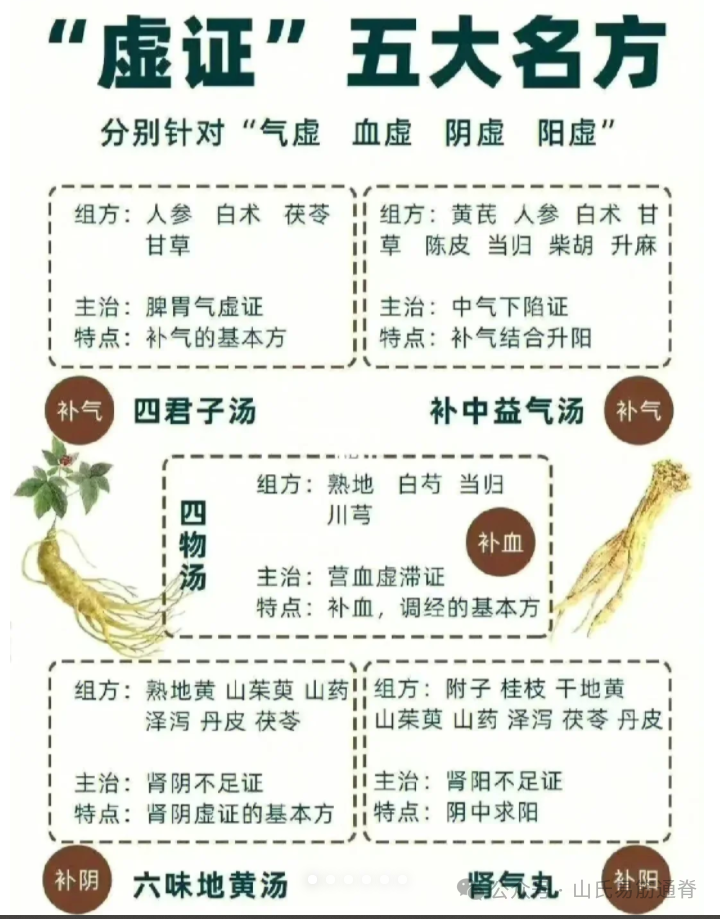
1. Symptoms of Qi Deficiency and Tonifying Herbs1Symptoms of Qi Deficiency
The main manifestations include fatigue, shortness of breath, and lethargy, indicating poor overall spirit and insufficient physical strength, easily leading to shortness of breath, pale complexion, poor appetite, and loose stools.
02Tonifying Herbs for Qi Deficiency
Commonly used tonics include Korean ginseng, white ginseng (raw sun-dried ginseng), wild mountain ginseng, red ginseng, Huai Shan, and jujubes.
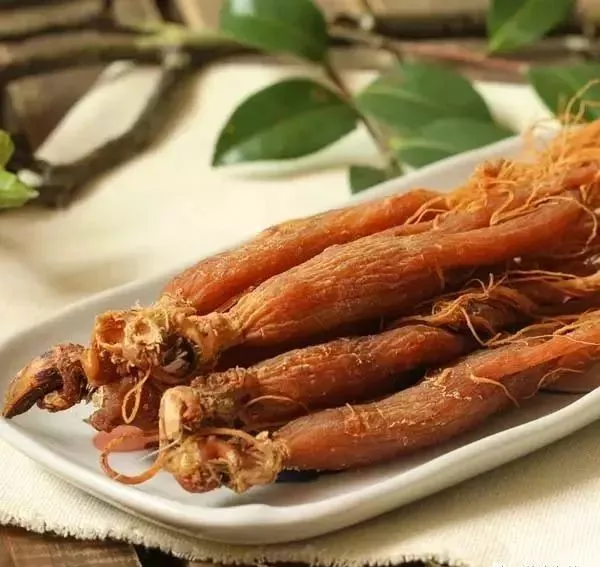
“Qi deficiency”, “Blood deficiency”, “Yin deficiency”, “Yang deficiency”.
Formulas for treating various deficiency syndromes: mainly composed of various tonifying herbs, which have the effect of nourishing the body’s Qi, Blood, Yin, and Yang, and are used to treat various deficiency syndromes.
In Traditional Chinese Medicine, deficiency syndromes are mainly divided into four symptoms: Qi deficiency, Blood deficiency, Yin deficiency, and Yang deficiency. Through this diagram, we hope everyone can understand what type of deficiency they have and how to use herbs.
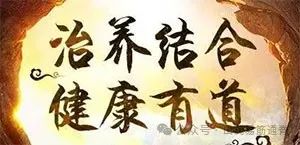
① Si Jun Zi Tang (Four Gentlemen Decoction)
【Ingredients】 Ren Shen (Ginseng) 9g, Bai Zhu (Atractylodes) 9g, Fu Ling (Poria) 9g, Gan Cao (Licorice) 6g.
【Usage】 Decoction in water.
【Effects】 Tonifies Qi and strengthens the spleen.
【Indications】 Spleen and stomach Qi deficiency syndrome. Pale complexion, low voice, shortness of breath, fatigue, poor appetite, loose stools, pale tongue with white coating, weak pulse.
【Pathogenesis】 This formula treats the deficiency of spleen and stomach Qi, which leads to insufficient transformation and transportation. The spleen and stomach are the foundation of postnatal health and the source of Qi and Blood production. When spleen and stomach Qi is deficient, food intake decreases; dampness and turbidity arise internally, leading to loose stools; the spleen governs muscles, and with spleen and stomach Qi deficiency, the muscles of the limbs are weak, resulting in fatigue; insufficient Qi and Blood production leads to a pale complexion; the spleen is the mother of the lung, and with spleen and stomach deficiency, lung Qi is also affected, leading to shortness of breath and low voice; pale tongue with white coating and weak pulse are all signs of Qi deficiency. The treatment should focus on tonifying the Qi of the spleen and stomach to restore their function of transformation and transportation.
【Key Points】 This formula is commonly used for treating spleen and stomach Qi deficiency syndrome and is a foundational formula for tonifying Qi. Many later formulas for tonifying the spleen and Qi have evolved from this formula. Clinical application focuses on pale complexion, poor appetite, shortness of breath, fatigue, pale tongue with white coating, and weak pulse as diagnostic key points.
【Application】 Suitable for chronic gastritis, gastric and duodenal ulcers in cases of spleen Qi deficiency.
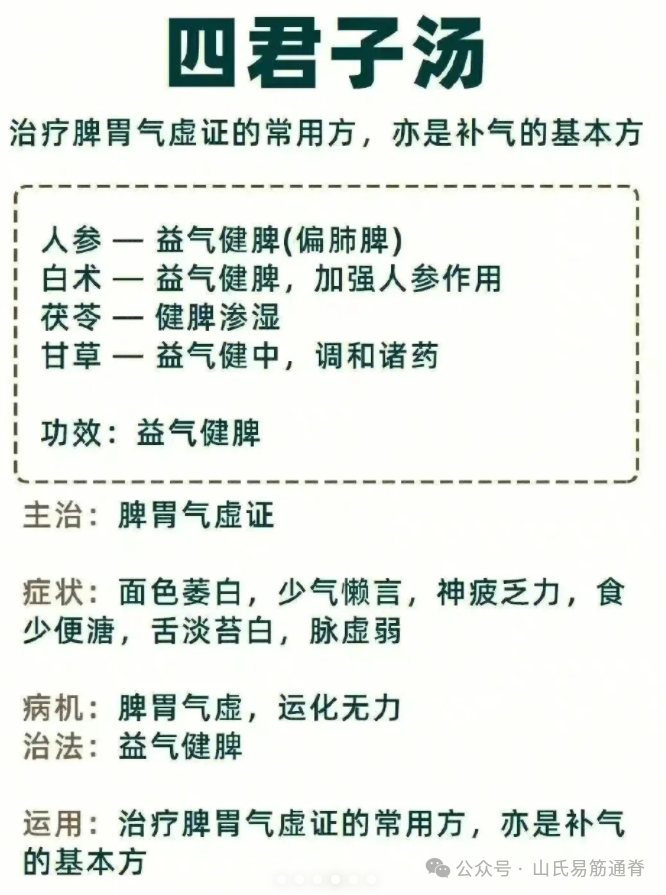
② Bu Zhong Yi Qi Tang (Tonify the Middle and Augment the Qi Decoction)
【Ingredients】 Huang Qi (Astragalus) 15g, Ren Shen (Ginseng or Codonopsis) 15g, Bai Zhu (Atractylodes) 10g, Zhi Gan Cao (Honey-fried Licorice) 15g, Dang Gui (Angelica Sinensis) 10g, Chen Pi (Aged Tangerine Peel) 6g, Sheng Ma (Cimicifuga) 6g, Chai Hu (Bupleurum) 12g, Sheng Jiang (Fresh Ginger) 9 slices, Da Zao (Jujube) 6 pieces.
【Usage】 All herbs are to be ground and made into one dose. Use 300ml of water, decoct until 150ml remains, strain, and take warm on an empty stomach.
【Effects】 Tonifies the middle, augments Qi, and lifts Yang.
【Indications】
1. Spleen Qi deficiency with Qi sinking syndrome. Reduced appetite, fatigue, weakness in limbs, shortness of breath, pale yellow complexion, loose stools, pale tongue, weak pulse; as well as prolapse of the rectum, uterine prolapse, chronic diarrhea, and metrorrhagia.
2. Qi deficiency with fever syndrome. Fever with spontaneous sweating, thirst for warm drinks, shortness of breath, fatigue, pale tongue, and weak pulse.
【Key Points】 This formula is a representative formula for tonifying Qi and lifting Yang, with sweet warmth to clear heat. Diagnostic key points include fatigue, weakness, shortness of breath, pale yellow complexion, and weak pulse.
【Application】 This formula has a wide range of clinical applications, such as organ prolapse, chronic diarrhea, chronic dysentery, rectal prolapse, myasthenia gravis, chyluria, chronic hepatitis, etc.; gynecological conditions such as uterine prolapse, pregnancy and postpartum urinary retention, fetal movement instability, and excessive menstruation; ophthalmological conditions such as eyelid ptosis and paralytic strabismus, all of which belong to spleen and stomach Qi deficiency or middle Qi sinking, can be adjusted and applied.
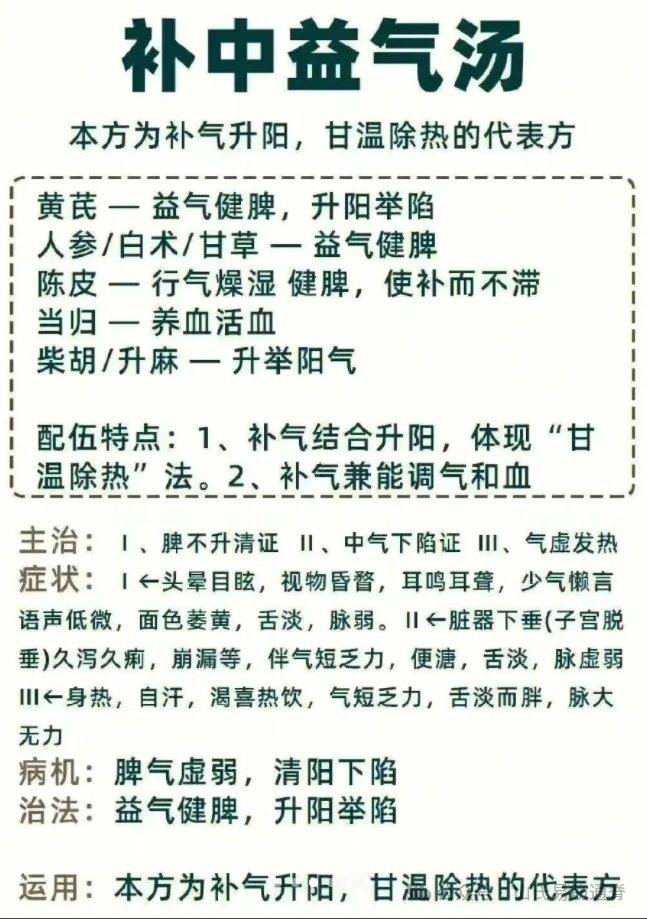
2. Symptoms of Blood Deficiency and Tonifying Herbs1Symptoms of Blood Deficiency
Generally manifested as dizziness, tinnitus, palpitations, insomnia, pale lips and nails, dreaming a lot, and women having scanty menstruation.
02Tonifying Herbs for Blood Deficiency
Commonly used tonics include E Jiao (Donkey-hide Gelatin), Dang Gui (Angelica Sinensis), etc.
③ Si Wu Tang (Four Substance Decoction)
【Ingredients】 Dang Gui (Angelica Sinensis) 9g (soaked in liquor and stir-fried), Chuan Xiong (Ligusticum) 6g, Bai Shao (White Peony) 9g, Shu Di Huang (Rehmannia) 12g (steamed with liquor).
【Usage】 Grind into coarse powder. Each dose is 15g, with one and a half cups of water, decoct until 80% remains, strain, and take warm before meals (modern usage: can be made into a soup and decocted).
【Effects】 Tonifies and regulates blood.
【Indications】 Nutritional blood stagnation syndrome. Dizziness, palpitations, insomnia, pale complexion, women with irregular menstruation, scanty flow or amenorrhea, abdominal pain, and possibly hard lumps, pale tongue, pale lips, and nails, thin and wiry or thin and rough pulse.
【Key Points】 This formula is used in “Xian Shou Li Shang Xu Duan Mi Fang” for treating external injuries with blood stasis and pain, and in the Song Dynasty’s “Tai Ping Hui Min He Ji Ju Fang” for women’s diseases. This formula is a foundational formula for tonifying blood and regulating menstruation. Diagnostic key points include pale complexion, pale lips and nails, pale tongue, and thin pulse.
【Application】 This formula is commonly used for women’s menstrual disorders, obstetric diseases, urticaria, chronic skin diseases, bone injuries, allergic purpura, and neurogenic headaches, all of which belong to nutritional blood stagnation.
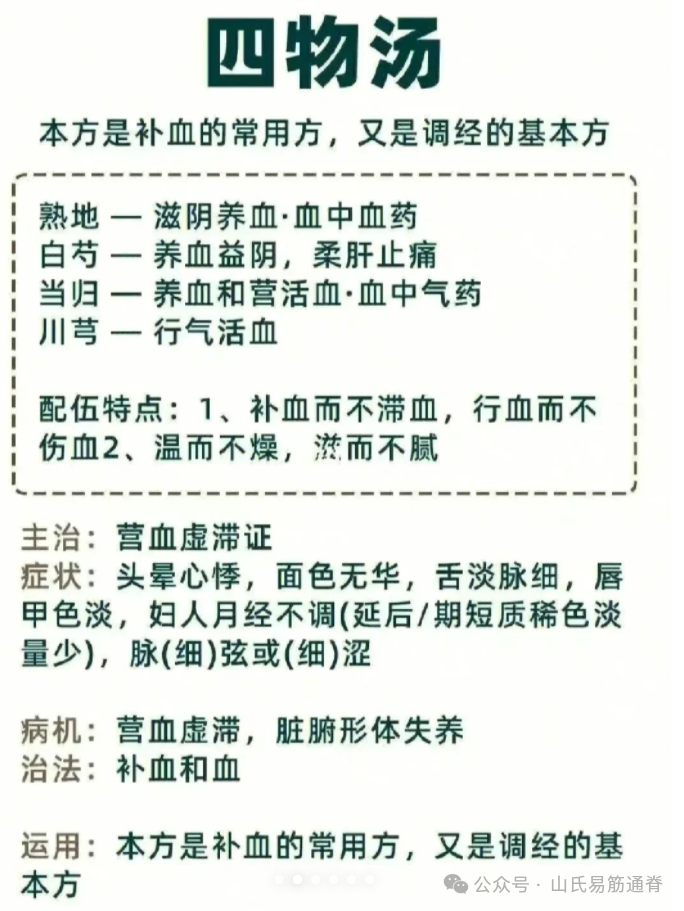
3. Symptoms of Yin Deficiency and Tonifying Herbs1Symptoms of Yin Deficiency
Main manifestations include dry mouth and throat, irritability, insomnia, hot palms and soles, constipation, irritability, lower back pain, and nocturnal emissions.
02Tonifying Herbs for Yin Deficiency
Commonly used tonics include tremella, Shu Di Huang (Rehmannia), Bai He (Lily), He Shou Wu (Fo-Ti), Gou Qi Zi (Goji Berries), and Liu Wei Di Huang Wan (Six Flavor Rehmannia Pill).
④ Liu Wei Di Huang Wan (Six Flavor Rehmannia Pill)
【Ingredients】 Shu Di Huang (Rehmannia) 24g, Shan Yao (Chinese Yam) 12g, Shan Zhu Yu (Cornus) 12g, Ze Xie (Alisma) 9g, Mu Dan Pi (Moutan) 9g, Fu Ling (Poria) 9g.
【Usage】 Grind into powder, mix with honey to form pills the size of a wutong seed. Take three pills with warm water on an empty stomach (modern usage: can also be decocted).
【Effects】 Nourishes the liver and kidneys.
【Indications】 Liver and kidney Yin deficiency syndrome. Lower back and knee soreness, dizziness, tinnitus, night sweats, nocturnal emissions, thirst, hot palms and soles, dry mouth and throat, loose teeth, heel pain, frequent urination, and in children, unclosed fontanelle, red tongue with little coating, and thin and rapid pulse.
【Key Points】 This formula is a foundational formula for treating liver and kidney Yin deficiency syndrome. Diagnostic key points include lower back and knee soreness, dizziness, dry mouth and throat, red tongue with little coating, and thin and rapid pulse.
【Application】 Commonly used for chronic nephritis, hypertension, diabetes, pulmonary tuberculosis, renal tuberculosis, hyperthyroidism, central retinal inflammation, and anovulatory functional uterine bleeding, as well as menopausal syndrome, all of which belong to liver and kidney Yin deficiency.
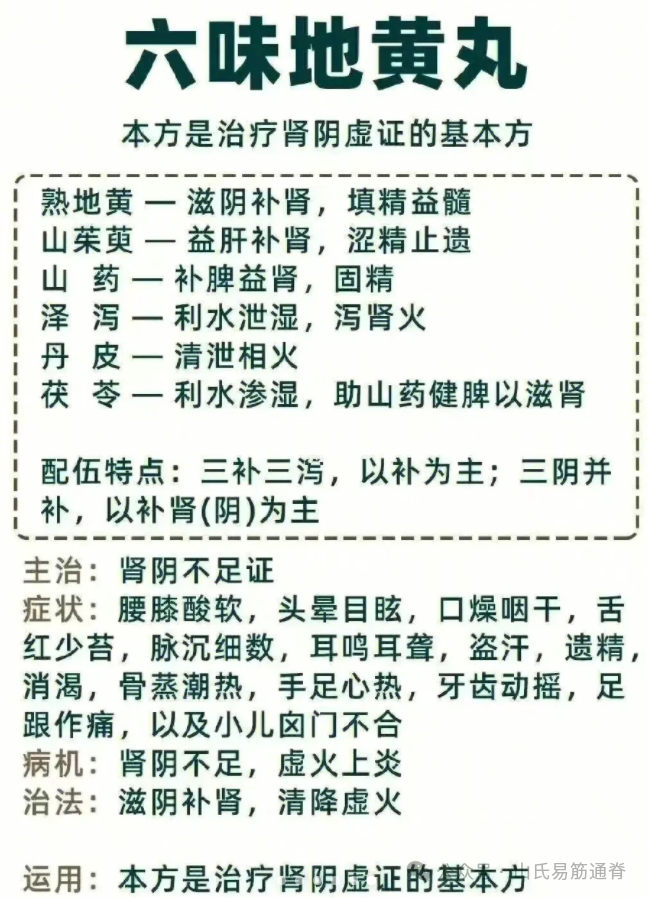
4. Symptoms of Yang Deficiency and Tonifying Herbs1Symptoms of Yang Deficiency
Main manifestations include pale complexion, fear of cold, cold limbs, lower back and knee soreness, impotence, premature ejaculation, limb swelling, loose stools, and preference for warm drinks or hot food.
02Tonifying Herbs for Yang Deficiency
Commonly used tonics include Cordyceps, Lu Rong (Deer Antler), Ren Shen (Ginseng), Ge Jie (Gecko), cinnamon, Fu Zi (Aconite), walnut meat, Shi Quan Da Bu Tang (Ten Complete Great Tonifying Decoction), and Shen Qi Wan (Kidney Qi Pill). These deficiency syndromes can occur alone or in combination, so caution is needed when supplementing, tailoring the herbs to the specific symptoms.
⑤ Shen Qi Wan (Kidney Qi Pill)
【Ingredients】 Gan Di Huang (Rehmannia) 24g, Yao Yao (Dioscorea) 12g, Shan Zhu Yu (Cornus) 12g, Ze Xie (Alisma) 9g, Fu Ling (Poria) 9g, Mu Dan Pi (Moutan) 9g, Gui Zhi (Cinnamon) 3g, Fu Zi (Aconite) 3g.
【Usage】 Grind into fine powder, mix with honey to form pills the size of a wutong seed, take 15 pills (6g) with wine, and repeat daily.
【Effects】 Tonifies the kidneys and assists Yang.
【Indications】 Kidney Yang deficiency syndrome. Lower back pain, weakness in the legs, cold sensation below the waist, urgency in the lower abdomen, difficulty urinating, or frequent urination, especially at night, impotence, premature ejaculation, pale and swollen tongue, weak pulse, and symptoms of phlegm-dampness, edema, thirst, and beriberi.
【Key Points】 This formula is commonly used for tonifying the kidneys and assisting Yang. Diagnostic key points include lower back pain, weakness in the legs, difficulty urinating or frequent urination, pale and swollen tongue, and weak pulse.
【Application】 Commonly used for chronic nephritis, diabetes, hyperaldosteronism, hypothyroidism, neurasthenia, adrenal cortex insufficiency, chronic bronchial asthma, and menopausal syndrome, all of which belong to kidney Yang deficiency.
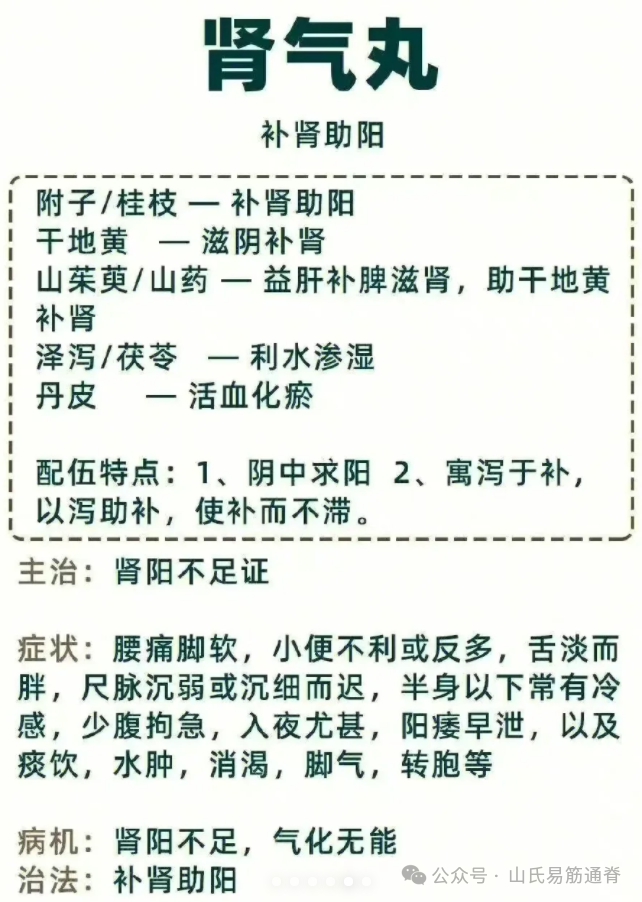
1. Qi Deficiency: Fatigue and Sweating
Symptoms: Shortness of breath, fatigue, dizziness, low voice, sweating easily with slight exertion, frequent urination with clear and long urine, loose stools or constipation.
Tongue Manifestation: Pale and tender tongue, white or slightly yellow coating.
Additional Formulas:
Heart Qi Deficiency—— Bai Zi Yang Xin Tang, Sheng Mai Yin
Lung Qi Deficiency—— Yu Ping Feng San, Bu Fei Tang
Spleen Qi Deficiency—— Si Jun Zi Tang, Bu Zhong Yi Qi Tang
Kidney Qi Deficiency—— Shen Qi Wan, Jin Suo Gu Jing Wan
Lung and Kidney Qi Deficiency—— Ren Shen Ge Jie San
Qi Deficiency with Sinking—— Bu Zhong Yi Qi Tang, Ju Yuan Jian
Qi Deficiency with External Wind-Cold and Internal Phlegm-Dampness—— Shen Su Yin
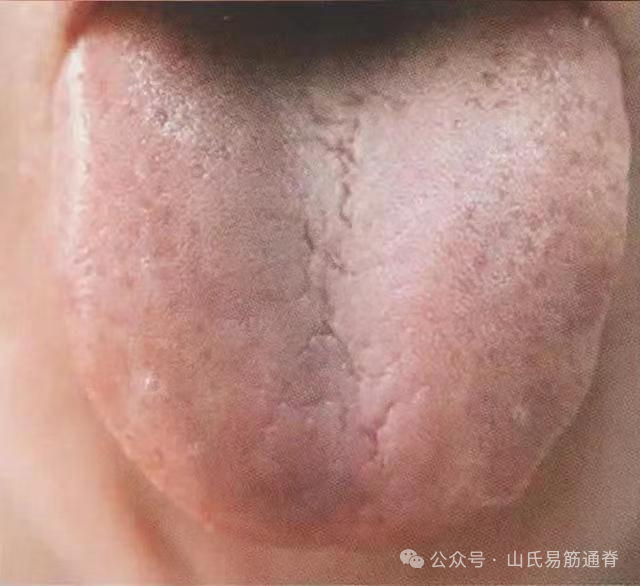
Qi Deficiency Tongue Manifestation
2. Blood Deficiency: Pale or Withered Complexion
Symptoms: Pale or lackluster complexion, pale eyelids, lips, and nails, dizziness, palpitations, insomnia, dreaming a lot, numbness in limbs, scanty menstruation in women.
Tongue Manifestation: Pale tongue with white coating.
Additional Formulas:
Liver Blood Deficiency—— Bu Gan Tang, Suan Zao Ren Tang, Dang Gui Shao Yao San
Heart and Spleen Blood Deficiency—— Gui Pi Tang, Ren Shen Yang Rong Tang
Liver Qi Stagnation with Blood Deficiency and Spleen Weakness—— Xiao Yao San
General Blood Deficiency—— Si Wu Tang, Ba Zhen Tang
Blood Deficiency with Cold—— Dang Gui Si Ni Tang, Jiao Ai Tang
Blood Deficiency with External Wind-Cold—— Cong Bai Qi Wei Yin
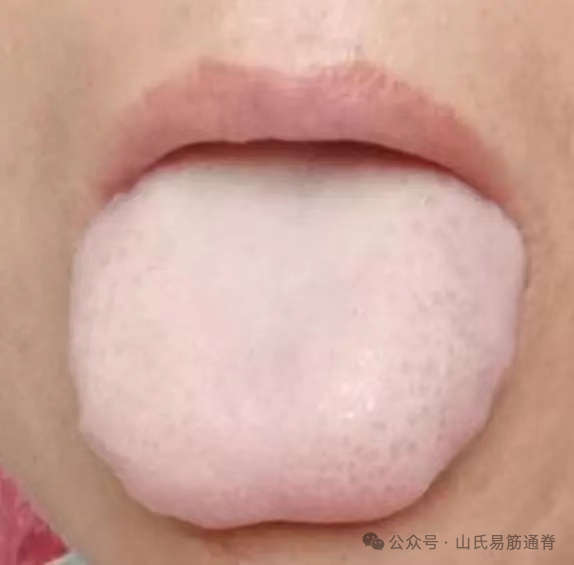
Blood Deficiency Tongue Manifestation
3. Yin Deficiency: Dryness and Irritability
Symptoms: Dry throat and mouth, weight loss, tidal fever, easy sweating, hot palms and soles, short and red urine, dry stools.
Tongue Manifestation: Red tongue with little coating, little moisture.
Additional Formulas:
Heart Yin Deficiency—— Tian Wang Bu Xin Dan, Zhu Sha An Shen Wan
Lung Yin Deficiency—— Sha Shen Mai Dong Tang, Bu Fei E Jiao Tang
Stomach Yin Deficiency—— Yi Wei Tang, Sheng Yang Yi Wei Tang
Kidney Yin Deficiency—— Zuo Gui Wan, Zuo Gui Yin, Liu Wei Di Huang Wan
Liver and Kidney Yin Deficiency—— Da Bu Yin Wan, Shi Hu Ye Guang Wan, Yi Guan Jian, Qi Bao Mei Ran Dan, Hu Qian Wan
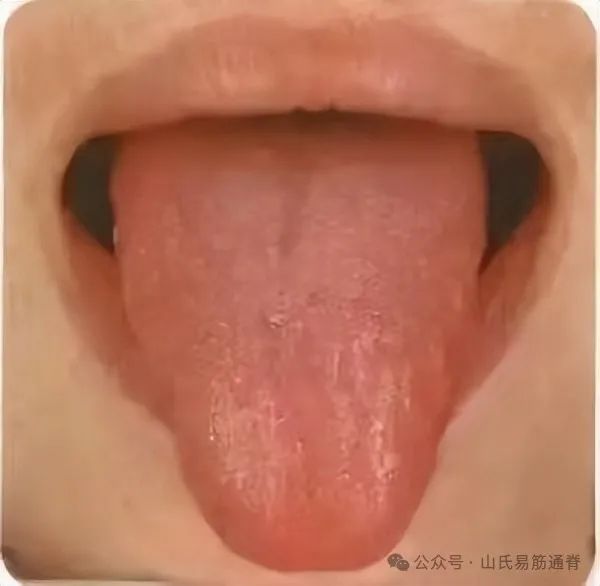
Yin Deficiency Tongue Manifestation
4. Yang Deficiency: Cold Sensitivity + Qi Deficiency Symptoms
Symptoms: Lack of taste, not thirsty, prefers warm water, fear of cold, cold limbs, shortness of breath, fatigue, clear and long urine, loose stools (Yang deficiency = Qi deficiency + fear of cold).
Tongue Manifestation: Pale, swollen, tender tongue with white slippery coating.
Additional Formulas:
Heart Yang Deficiency—— Gui Zhi Gan Cao Tang
Heart Yang Collapse—— Shen Fu Tang, Shen Fu Long Mu Tang
Spleen Yang Deficiency—— Li Zhong Wan, Fu Zi Li Zhong Tang
Kidney Yang Deficiency—— Ji Chuan Jian, You Gui Yin, You Gui Wan, Zhen Wu Tang
Spleen and Kidney Yang Deficiency—— Si Shen Wan, Shi Pi San
Yang Qi Deficiency with External Wind-Cold—— Zai Zao San
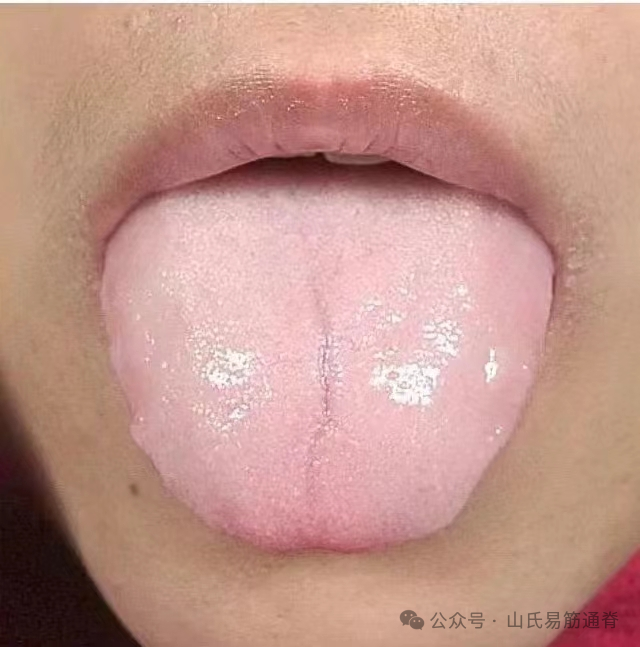
Yang Deficiency Tongue Manifestation

